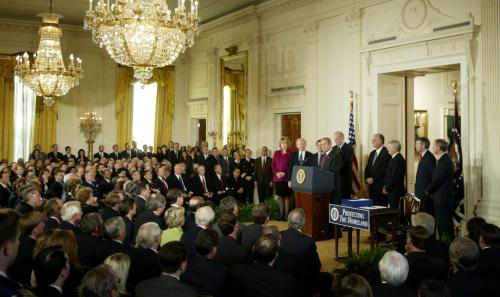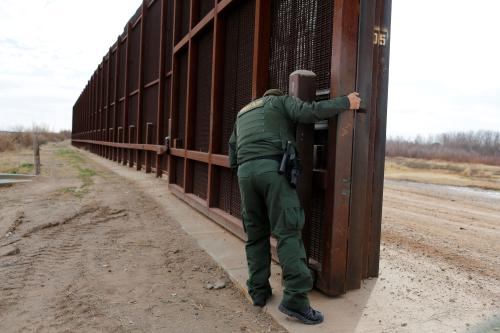This week the Senate will consider the confirmation of retired General John Kelly to be Secretary of the Department of Homeland Security. If confirmed, he will take over the newest Cabinet department at a critical juncture in history as the threats to America’s homeland run the gamut from how to build old fashioned walls on the southern border to how to fight cyber-attacks from “troll farms” in St. Petersburg Russia.
Like many of the newer Cabinet agencies, DHS is a combination of several pre-existing entities—as a result, the department was considered an awful mess for much of its first decade. Instead of creating one oversight committee for the new department, congressional committees retained their oversight over each of the pieces; hence it is overseen by a maze of congressional committees. Formed in the aftermath of 9/11, it quickly became known as a dumping ground for political appointees. Last fall there was a rare increase in employee morale, which had declined for the previous six years straight. It has spent many years on the GAO (Government Accountability Office) High-Risk List and continues to have significant problems managing information technology, acquisitions, and coordination across its component departments.
But even as the department weathered its growing pains under capable leaders like Tom Ridge, Michael Chertoff, Janet Napolitano, and Jeh Johnson, the challenges it faced kept growing. The core of the department (in both people and money) is made up of agents protecting the northern and southern borders, and the Coast Guard which protects the waters around us. However, when it comes to the borders, DHS has to share that mission with the State Department which retained the function of giving out visas to incoming visitors—many of whom have historically turned into permanent visitors.
As we move from old-fashioned bricks and mortar threats to cyber threats, the situation gets even more fragmented. In theory, DHS has responsibility for cyber-security at home—and yet the newly created Cyber Command at the Department of Defense overwhelms DHS resources in both personnel and money. DHS, like the rest of the government, has terrible trouble recruiting and retaining cyber talent, in spite of serious efforts like those made under Janet Napolitano, to get extra money and flexibility.
On top of these basic management challenges, Kelly will find himself in the eye of the storm on both sides of the aisle. From the president himself and the president’s core supporters on the far right, he will face pressure to build a wall and to increase deportations. Recently the president-elect reiterated his insistence that Mexico will pay for that wall. But in the meantime what should the secretary do? Ask Congress for the money to build the wall and risk getting less money for other parts of the department? Ask for a loan? As for deportations, will Kelly be able to show significant increases over past Administrations given that the wave of illegal immigration from Mexico is reversing not increasing?
From the Democrats, Kelly will find himself under extraordinary pressure to upgrade the department’s capacity in cyber-security. While Trump and his people have systematically denied or downplayed the Russian hacking of the Democratic National Committee, Democrats and some Republicans see this as a major threat to American democracy and the opening volley of a second cyber cold war. In fact, this month DHS added elections to the list of critical infrastructure. So far the Trump administration seems to see the entire hacking episode as some sort of Democratic plot to undermine his presidency. Will the White House slap down Kelly if he takes the hacking episode too seriously?
Kelly is one of Trump’s more popular appointments. He has the background, ability, and prestige to be a successful Homeland Security chief. As a former General he is familiar with national security policy and managing large bureaucracies. The Homeland Security Department is part of an elaborate web of national security, defense, cybersecurity, intelligence, disaster relief, and law enforcement policy networks. For Kelly to be successful, he must guarantee that different and often competing agencies and offices within his Department coordinate effectively, while ensuring cooperation across agencies and departments beyond Homeland Security.
There are, of course, downsides to Kelly’s background. The Department of Homeland Security, like any civilian unit of the United States government, does not run with military efficiency. Responsiveness to a general is much stronger than responsiveness to a cabinet secretary. Kelly will need to adjust to civilian bureaucracy and his role leading it. One aspect of the job will carry a new type of expectation for which Kelly may not be entirely accustomed: customer service. Whether it is FEMA aiding individuals left homeless in the wake of a hurricane or flood, angry passengers waiting hours in a TSA line at Kennedy Airport, or soon-to-be Americans expecting their citizenship paperwork to be processed on time, Homeland Security has an outward facing, point-of-sale aspect that few generals experience.
And finally, of course, there is politics. There is probably no other department in the government that contains so much responsibility over issues of intense partisan concern than DHS. Kelly comes into his confirmation hearings with support from both sides of the aisle. But in the Trump administration the entire department will be in the middle of controversy sure to test even the most adroit leader.









Commentary
The confirmation hearing for General John Kelly (ret.): From walls to troll farms
January 9, 2017